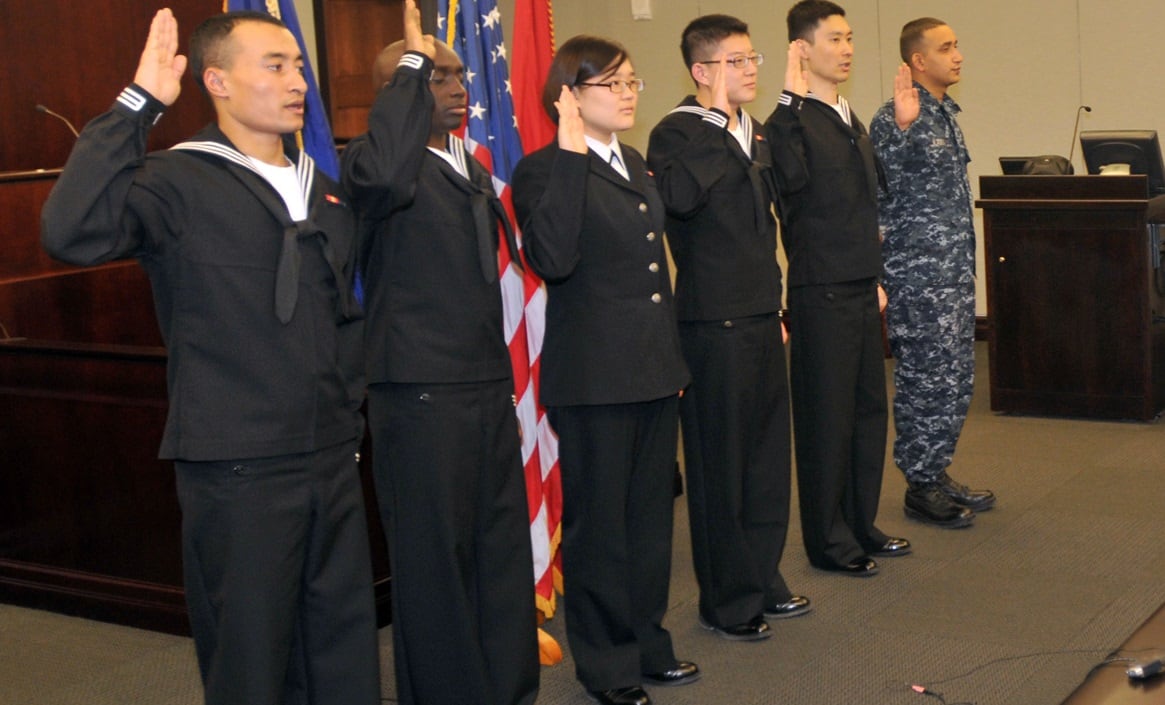The Pentagon pushed back against criticism that it was weeding out foreign-born troops Tuesday and released court filings to show some international recruits in a program that granted citizenship through military service had falsified their background records and were connected to state-sponsored intelligence agencies, which led DoD to believe the program was vulnerable to insider threat.
The filings, from Tiwari v. Mattis, “provide context for you regarding the true national security issues at stake,” said Pentagon spokeswoman Air Force Maj. Carla Gleason. The U.S. District Court Western District of Washington is considering the lawsuit, which was filed on behalf of 17 foreign-born military recruits who enlisted through the Military Accessions Vital to the National Interest program but have not been able to clear additional security requirements the military put in place in 2016 and 2017.
RELATED

The program has been suspended since 2016 and about 1,000 recruits remain in limbo, unable to enter basic training and at risk of timing out of the program or having their visas expire. Immigration attorneys representing the clients have said the military never put adequate resources in place to process all the applicants and that the delays in screening are a way to shut the program down.
Approximately 10,000 foreign-born troops have earned citizenship through MAVNI, which was put in place to help the military attract critical language and medical skills. In 2017 Defense Secretary Jim Mattis said he would like to see the program continued if security issues could be addressed.
RELATED

In a statement filed by Roger Smith, branch chief for personnel security policy at the Office of the Under Secretary of Defense for Intelligence, DoD argued that regular reviews of the program found security holes, including that some applicants could not be vetted because the U.S. lacked “access and the ability to conduct standard security screening and interviews with associates, friends, and family members, as many MAVNI soldiers are from nations who remain hostile to the United States or do not have data-sharing agreements with the United States.”
In addition, in his statement Smith said that through a 2016 review, DoD found that “(1) a number of individuals accessed into the military based on receiving fraudulent visas to attend universities that did not exist; (2) some MAVNI recruits attended, and later falsified transcripts from, universities owned by a Foreign National Security Agency and a State Sponsored Intelligence Organization (notably, most of the university classmates of one MAVNI recruit later worked for the same State Sponsored Intelligence Organization); and (3) one MAVNI recruit who entered the United States on a student visa professed support for 9/11 terrorists and said he would voluntarily help China in a crisis situation.”
RELATED

Further, Smith said, “the review uncovered a case where a MAVNI applicant failed to list foreign contacts from Eastern Europe and Russia, even though the recruit’s father manages the military department of a foreign factory and his brother-in-law worked for a foreign political party. In DoD’s judgment, these examples indicated that sufficient vetting of MAVNI personnel was not occurring at the accessions stage, contrary to the goal of avoiding altogether the accessions of individuals who present potential counter-intelligence, security, or insider threats.”
Tara Copp is a Pentagon correspondent for the Associated Press. She was previously Pentagon bureau chief for Sightline Media Group.





